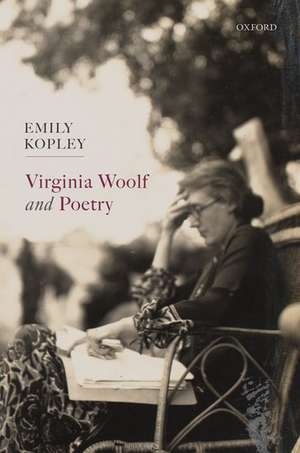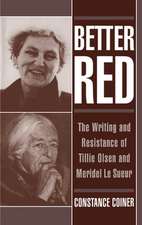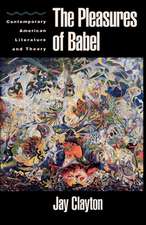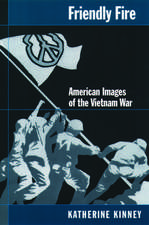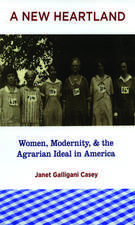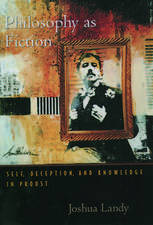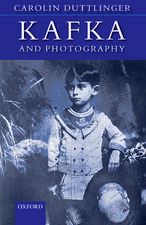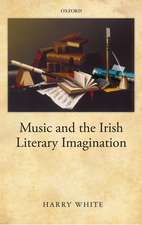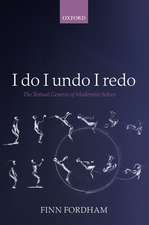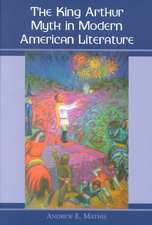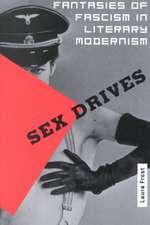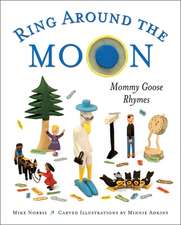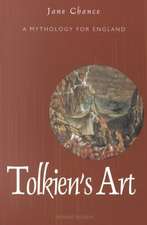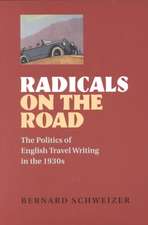Virginia Woolf and Poetry
Autor Emily Kopleyen Limba Engleză Hardback – 10 iun 2021
Preț: 538.85 lei
Preț vechi: 615.49 lei
-12% Nou
Puncte Express: 808
Preț estimativ în valută:
103.14€ • 112.07$ • 86.69£
103.14€ • 112.07$ • 86.69£
Carte tipărită la comandă
Livrare economică 09-15 aprilie
Preluare comenzi: 021 569.72.76
Specificații
ISBN-13: 9780198850861
ISBN-10: 0198850867
Pagini: 416
Ilustrații: 32 Illustrations
Dimensiuni: 163 x 241 x 28 mm
Greutate: 0.78 kg
Editura: OUP OXFORD
Colecția OUP Oxford
Locul publicării:Oxford, United Kingdom
ISBN-10: 0198850867
Pagini: 416
Ilustrații: 32 Illustrations
Dimensiuni: 163 x 241 x 28 mm
Greutate: 0.78 kg
Editura: OUP OXFORD
Colecția OUP Oxford
Locul publicării:Oxford, United Kingdom
Recenzii
Kopley's style was a joy to read in and of itself: at once clear, succinct and evocative, with a flow and rhythm which complemented but did not overpower the quotations from Woolf's own prose. It is altogether an accomplished publication. . .Kopley [brings] characterisation and a real flair for narrative story-telling into the mix. . .Overall, this was a thoroughly enjoyable and informative book which will add much to Woolf scholarship. It will also be an important text for anyone researching the novel more widely, those interested in gendered literary history or the study of the inter-relationship between lived experience, creativity and literary output. More than that, though, it is highly recommended to all who enjoy thoughtful, intelligent biography. I for one am very much looking forward to reading whatever Kopley may be working on next.
It is inspired research written in gorgeous prose and will delight anyone interested in the influence that poetry and prose historically exert on each other. Kopley's study opens new vistas for understanding the exquisite tension that lies at the bottom of Woolf's often challenging but always beautiful writing.
The achievement of this important study is to frame that question [of Woolf's engagement with poetry and poets] in practical terms, pursue it thoroughly across the decades of Woolf's writing, and arrive at conclusions so compelling that once laid out they appear obvious...The book should be as accessible and useful a resource for undergraduates as it will be a rich and illuminating one for Woolf scholars.
This assured, well-researched work draws on both published and unpublished sources to artfully weave the story of Woolf's relationship with poetry through a solid framework of her key life events. [...] At a time when it is becoming more difficult for any author to find a new, original angle on Woolf's life and work, Virginia Woolf and Poetry proves a welcome surprise.
It is no exaggeration to say that many of the works published on Virginia Woolf in 2021 will come to define the field in future years. Emily Kopley's landmark monograph, Virginia Woolf and Poetry is an exhaustively researched and enlightening study of Woolf's literary debt to her poetry-writing forebears and contemporaries. Kopley posits a novel theory of Woolf as a novelist doubly rooted in her 'consideration of the waning power of poetry and the waxing power of the novel' and a 'strong association of printed verse with male power'. Virginia Woolf and Poetry stands as a singularly impressive scholarly achievement. It offers novel, deeply researched and rigorously argued insights into Woolf's developing practice as a writer, into her interlocutors, and into her writings.
Emily Kopley's outstanding book Virginia Woolf and Poetry is, surprisingly, the first fully to explore the mysterious status of poetry in Woolf's work and to articulate debates about the poetics with which her writing engages. [....] Every page of this insightful, sustained work contains a gem that will help readers appreciate an aspect of Woolf's writing afresh. [....] Critical works come and go, reflective of the theoretical fashions of the times. Only a few will be read on into the future because they have definitively altered our understanding; Virginia Woolf and Poetry is such a book.
Poetry is, surprisingly, the first fully to explore the mysterious status of poetry in Woolf's work and to articulate debates about the poetics with which her writing engages.
Emily Kopley's Virginia Woolf and Poetry (2021) .... opens and refreshes myriad avenues of research on Woolf, the Woolfs' library, reading, literary genres, biography, reception studies, archival studies, textual criticism, late modernism, and more. I thank .... Kopley ... for the achievement of her study [and] for the inspiration it will give (is already giving) to future research.
Illuminating Woolf's various conversations with friends, writers, and books, Kopley's work is an exploration of these relationships, not just on a textual level but also through a study of Woolf's library. Kopley displays for us Woolf's poetry books, which she inherited from the male side of her family, the books written by the younger generation of Julian Bell, which Woolf read and commented on, and the books she read for pleasure or to review. Balancing close reading, historical and biographical context, and a rigorous materialist approach to its subject, Virginia Woolf and Poetry captures the complex and multifaceted dimensions of Woolf's practice of literature as a social and intellectual activity that is fundamentally relational.
kopley identifies woolf's adolescent exhilaration on reading poetry in the hot grass with her adult exhilaration on writing prose and she compounds the poetry prose binary with the ill healthy binary in adding that the sense of discovery she experiences on reading poetry in the hot grass as a depressed adolescent is the same sense of discovery Woolf conveys in prose as a healthy adult so illness reveals to woolf an aesthetic she recreates when well and thus kopley's pleasing parallelisms begin to persuade us of how woolf's prose gets on the scent of poetry without itself being poetry because poetry per se as kopley argues is for woolf always already patriarchal...and kopley's pleasing parallelisms further please because they give some welcome pause to the pathologizing of woolf's talent.
Emily Kopley's welcome volume shows that there is much to be gained by singling out the strand of poetry from the more complicated web of Woolf's interests in reading and writing, and it offers insights on Woolf's development as a modernist novelist during an era that also saw many experiments in poetry and the concomitant intense debates about what constituted poetry....In an interesting piece of genetic criticism, Kopley shows how A Room of One's Own (1929) engaged closely with ideas about the history of genre within the emerging field of English Studies ... One very interesting strand that emerges across Kopley's book concerns Woolf's fascination with elegies....
Kopley's chapter [on Woolf and the Thirties poets] sharply illuminates how Woolf's cross-generational discourse surrounding the competing possibilities of poetry and prose contributed to Woolf's thinking on class and literary form, energizing her feminism.
Virginia Woolf and Poetry is thoroughly well-researched and at the same time historically conscientious [...] It does what it sets out to do reliably, sensibly, and as lucidly as its primary materials allow, and in the process yields much food for thought regarding Woolf's poetically infused fiction. In short, Kopley's study makes a substantial contribution to scholarship and provides indispensable reading for anyone interested in Woolf's complex engagement with poetry.
It is inspired research written in gorgeous prose and will delight anyone interested in the influence that poetry and prose historically exert on each other. Kopley's study opens new vistas for understanding the exquisite tension that lies at the bottom of Woolf's often challenging but always beautiful writing.
The achievement of this important study is to frame that question [of Woolf's engagement with poetry and poets] in practical terms, pursue it thoroughly across the decades of Woolf's writing, and arrive at conclusions so compelling that once laid out they appear obvious...The book should be as accessible and useful a resource for undergraduates as it will be a rich and illuminating one for Woolf scholars.
This assured, well-researched work draws on both published and unpublished sources to artfully weave the story of Woolf's relationship with poetry through a solid framework of her key life events. [...] At a time when it is becoming more difficult for any author to find a new, original angle on Woolf's life and work, Virginia Woolf and Poetry proves a welcome surprise.
It is no exaggeration to say that many of the works published on Virginia Woolf in 2021 will come to define the field in future years. Emily Kopley's landmark monograph, Virginia Woolf and Poetry is an exhaustively researched and enlightening study of Woolf's literary debt to her poetry-writing forebears and contemporaries. Kopley posits a novel theory of Woolf as a novelist doubly rooted in her 'consideration of the waning power of poetry and the waxing power of the novel' and a 'strong association of printed verse with male power'. Virginia Woolf and Poetry stands as a singularly impressive scholarly achievement. It offers novel, deeply researched and rigorously argued insights into Woolf's developing practice as a writer, into her interlocutors, and into her writings.
Emily Kopley's outstanding book Virginia Woolf and Poetry is, surprisingly, the first fully to explore the mysterious status of poetry in Woolf's work and to articulate debates about the poetics with which her writing engages. [....] Every page of this insightful, sustained work contains a gem that will help readers appreciate an aspect of Woolf's writing afresh. [....] Critical works come and go, reflective of the theoretical fashions of the times. Only a few will be read on into the future because they have definitively altered our understanding; Virginia Woolf and Poetry is such a book.
Poetry is, surprisingly, the first fully to explore the mysterious status of poetry in Woolf's work and to articulate debates about the poetics with which her writing engages.
Emily Kopley's Virginia Woolf and Poetry (2021) .... opens and refreshes myriad avenues of research on Woolf, the Woolfs' library, reading, literary genres, biography, reception studies, archival studies, textual criticism, late modernism, and more. I thank .... Kopley ... for the achievement of her study [and] for the inspiration it will give (is already giving) to future research.
Illuminating Woolf's various conversations with friends, writers, and books, Kopley's work is an exploration of these relationships, not just on a textual level but also through a study of Woolf's library. Kopley displays for us Woolf's poetry books, which she inherited from the male side of her family, the books written by the younger generation of Julian Bell, which Woolf read and commented on, and the books she read for pleasure or to review. Balancing close reading, historical and biographical context, and a rigorous materialist approach to its subject, Virginia Woolf and Poetry captures the complex and multifaceted dimensions of Woolf's practice of literature as a social and intellectual activity that is fundamentally relational.
kopley identifies woolf's adolescent exhilaration on reading poetry in the hot grass with her adult exhilaration on writing prose and she compounds the poetry prose binary with the ill healthy binary in adding that the sense of discovery she experiences on reading poetry in the hot grass as a depressed adolescent is the same sense of discovery Woolf conveys in prose as a healthy adult so illness reveals to woolf an aesthetic she recreates when well and thus kopley's pleasing parallelisms begin to persuade us of how woolf's prose gets on the scent of poetry without itself being poetry because poetry per se as kopley argues is for woolf always already patriarchal...and kopley's pleasing parallelisms further please because they give some welcome pause to the pathologizing of woolf's talent.
Emily Kopley's welcome volume shows that there is much to be gained by singling out the strand of poetry from the more complicated web of Woolf's interests in reading and writing, and it offers insights on Woolf's development as a modernist novelist during an era that also saw many experiments in poetry and the concomitant intense debates about what constituted poetry....In an interesting piece of genetic criticism, Kopley shows how A Room of One's Own (1929) engaged closely with ideas about the history of genre within the emerging field of English Studies ... One very interesting strand that emerges across Kopley's book concerns Woolf's fascination with elegies....
Kopley's chapter [on Woolf and the Thirties poets] sharply illuminates how Woolf's cross-generational discourse surrounding the competing possibilities of poetry and prose contributed to Woolf's thinking on class and literary form, energizing her feminism.
Virginia Woolf and Poetry is thoroughly well-researched and at the same time historically conscientious [...] It does what it sets out to do reliably, sensibly, and as lucidly as its primary materials allow, and in the process yields much food for thought regarding Woolf's poetically infused fiction. In short, Kopley's study makes a substantial contribution to scholarship and provides indispensable reading for anyone interested in Woolf's complex engagement with poetry.
Notă biografică
Emily Kopley received her bachelor's degree from Yale University and her doctorate from Stanford University. She is a Research Affiliate in the Department of English at Concordia University. Her work on Woolf has appeared in The Review of English Studies, the TLS, and elsewhere. She is a board member of Woolf Studies Annual.
